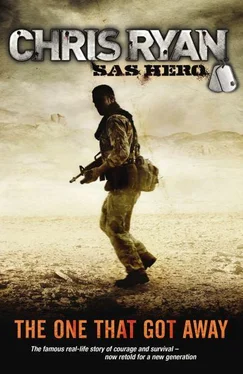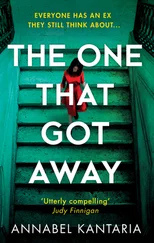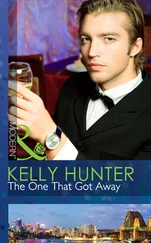It seemed crazy to be flying to Cyprus. The island lies more or less due west of Damascus, and it was east that I wanted to be heading. But the flight lasted less than a couple of hours, and soon we were coming in to land at Larnaca.
All the while I had only one thing on my mind: what was the score back in the squadron?
CHAPTER 16
Back to Base

The defence attaché had arranged for me to be met in Cyprus, and once I’d collected my bag — which I was relieved to see had got on board OK — and got it through customs, I was met by a guy from the Joint Intelligence Company. He didn’t know who I was — just that I was passing through. As he led me across to a car, he said he was taking me to a family who’d agreed to put me up. Once we were rolling, he asked if I needed to see anybody.
‘Yes,’ I said. ‘I need to see a doctor.’
‘What’s wrong?’
‘Well, for starters, I think I drank some poisonous water. Also, my feet are in bits. And look at that.’
I held out my hand to show him my fingers, which had not only lost all feeling in the tips, but now seemed to be turning blue. He gave me a strange look, but I didn’t tell him where I’d been.
We drove into a nice-looking housing estate, with guards on the entrance, and I was met by an RAF squadron leader, who introduced me to his Scottish wife and their two young kids. No questions were asked; obviously they’d been briefed. They just welcomed me and sat me down.
‘Can I make you something to eat for tea?’ the wife asked. ‘It won’t take a minute. EastEnders is on the telly.’
So there I sat, watching EastEnders and eating eggs, beans and chips. After everything I’d been through, it felt really weird.
A doctor turned up and asked me what was wrong.
‘It’s my fingers,’ I told him. ‘I can’t feel them much, and they keep going blue.’
He did the squeeze test a few times and said, ‘Well, the colour seems to be coming back. I think you’ve got a bit of frost-nip, that’s all.’ Then he looked at my feet, cleaned them up as much as he could, put zinc oxide tape on them and left me some spare tape. ‘There’s not a lot I can do for you,’ he said. ‘Is there anything else wrong?’
‘Well, I was round a chemical plant and drank some of the effluent. Could that be having an effect on my hands?’
‘I don’t see how it could. But you ought to have blood tests and other checks when you get back home.’
When he’d gone, the woman gave me a beer, which went down well, and we sat around chatting. Then, just before 8 p.m., the husband said, ‘Right, I’m off to work. I’ll be back at four in the morning to pick you up.’
My hostess showed me to a bedroom. ‘Would you like to get your head down?’ she asked.
‘Great,’ I said. But first I went to have a bath, because I’d got so sticky on the aircraft. When I stripped off, I was shocked. My legs had gone blue — worse than my hands!
For a few seconds I was horrified — then I realized what the problem was. The dye had been coming out of my new Syrian cords, onto my hands as well. What a wally I felt, after that scene with the doctor! At least now I knew why I kept turning blue. But no matter what their colour was, my hands weren’t right; my fingers were still feeling woody.
I got my head down, and the next thing I knew, my host was knocking on my door at 4 a.m. His wife was already up and had made a cup of tea; she was waiting for us downstairs, and as we went out I thanked her for looking after me.
At Akrotiri airbase we were confronted by an RAF corporal. ‘Where’s your ID card?’ he demanded.
‘I haven’t got one.’
‘Passport?’
‘Haven’t got one.’ (In fact, I had the passport which they’d made out for me in Damascus, but I wasn’t going to show it to him.)
‘Name?’
‘There’s no name.’
‘Well, who are you?’
‘I’m a person that’s getting on this flight.’
Behind me was the squadron leader who’d been looking after me. He was carrying my bags, and now he said, ‘It’s all right. I’ll vouch for him.’
‘OK, sir,’ said the corporal, and we walked through.
By then the flight crew had assembled, and the chief loadie — the flight sergeant in charge of the back of the Hercules — had heard all this. He was quite a big lad, and he stood there watching.
The squadron leader came in, put my bags down and said, ‘You’ll be going aboard with this flight crew. Soon as they go, you get on too.’ He went across to them and said, ‘That’s some extra luggage you’ve got.’ Then he shook hands with me. I thanked him, and he left.
The flight crew were all laughing and joking together. I sat by myself across the room, and after a few minutes the flight sergeant came across. ‘Who are you, then?’ he asked.
‘I’m not telling you.’
‘What?’
‘Mind your own business,’ I said, and looked down.
‘Who d’you think you are?’
‘What’s it got to do with you?’
‘If you don’t tell me who you are,’ said the flight sergeant, ‘you’re not getting on my aircraft.’
‘If I don’t get on,’ I told him, ‘I guarantee your career will end when this aircraft touches down in Riyadh. Now stop asking questions.’
It was out of character for me to be so aggressive, but I felt I’d been through so much that I wasn’t going to bow down to anybody. These arguments were typical of what happens if someone tries to push an SAS guy. It’s a privilege, a sort of power for people in the Regiment — they don’t have to tell out siders anything. With officers, obviously, you’re polite, and if they ask for your identity, you just say, ‘Sorry, sir, I can’t tell you.’ Most people have the sense to back off if you tell them in a civil way that they don’t need to know. But there are always one or two who push and push, until it comes to the point when you have to lay down the law.
The back of the Herc was packed full of equipment, netted and strapped down on pallets. As I sat on one of the web seats, the first person I saw was Mel, a young signaller from 22 SAS. The flight sergeant knew where Mel came from — so when he saw us together, he realized that I was SAS and that he’d put his foot in it. I tried to find out from Mel if there was any news of the rest of the patrol. There was none.
Four hours later I landed in Riyadh for the second time. I was put up in a hotel, where the Director — the brigadier in command of Special Forces — came to visit me. He was a ‘B’ Squadron man himself, and he saw my escape as a feather in the squadron’s cap. First thing next morning, he said, I was to fly up to Al Jouf on a Hercules. And that was what I’d been waiting for.
* * *
I couldn’t come to terms with the fact that there was no news of the others. Because the Iraqis had not announced the capture of any prisoners behind the lines, it seemed more and more likely that they were all dead. Everyone kept asking me what had happened, but the truth was that I wanted to know the score as much as them.
In the morning I dressed in my clean uniform, which had been through the washing machine at the embassy in Damascus. It felt good to have it on again. My feet were still pretty sore, but I got my boots back on, and so looked quite presentable.
As the aircraft landed at Al Jouf I was so excited by the thought of seeing the guys again that I went and stood on the tailgate as it was dropping down, ready to rush out and greet them. But to my surprise there was only one man there — Geordie, the Squadron Sergeant Major. He had told everyone else to keep away, in case I was overwhelmed by emotion. In fact, three of the guys had ignored his instructions and were hovering in the background. As I walked out, they came racing across and surrounded me, hammering me on the back, and calling out, ‘Well done!’
Читать дальше













